In March 2023, transform! europe organised a historical study trip to Athens in cooperation with the association present:history, which provides historical-political educational work and is dedicated to the critical examination of intersections between history and the present.
On our five-day history trip to Athens in March 2023, we took a closer look at the history of the Greek Left in the 20th century. We focused on time periods when left-wing organisations were banned, but also discussed the weight of anti-communist discourses up to the present day. Despite authoritarian structures and their own marginalisation, left-wing actors found activity areas to invest in and were able to play a decisive role in shaping Greek society.
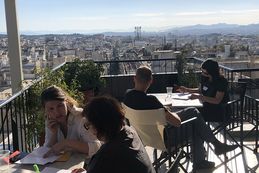
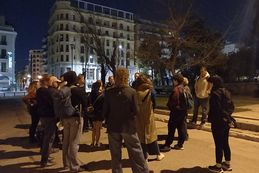
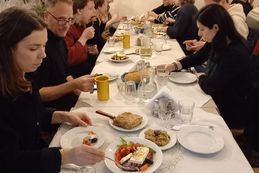
A group of 24 people of mixed ages from Austria and Germany, we started our trip with an introductory round on the rooftop terrace of our hotel in Athens. Then we learned about key moments of the Greek Left in the 20th century on a city walk with historian Kostis Karpozilos. We concluded our first day with a collective dinner.
We started each of the next two days with interactive group activities. The participants designed a timeline highlighting key political events and time periods of Greek history. In a text workshop, the participants read, discussed, and presented papers on various aspects of the Greek Left. In the subsequent discussion, the close interdependence between the individual room for manoeuvre and the larger (geo-)political context became obvious.
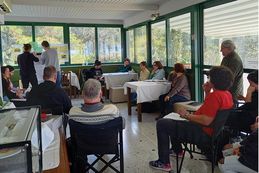
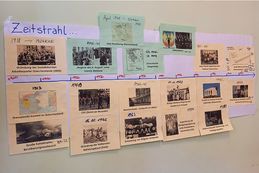
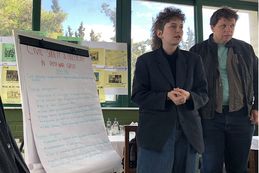
On days 2 and 3, we moved away from the broad historical overview and focused on the interwar period. We first listened to an introductory lecture by historian Vassilis Georgakis on Greece’s economic and social development. Afterwards, we delved into the years 1922/23 and their profound ramifications on Greek society: following the Greek army’s defeat in Turkey, more than one million refugees arrived in Greece from Asia Minor, about a quarter of the total population at the time.
We visited the exhibition "1922-2022: Stories of Survival and Integration" at the Library of the Hellenic Parliament then met with social scientist Olga Lafazani and historian Eleni Kyramargiou for a city walk in Níkaia in the southern outskirts of Athens. We learned about the difficult conditions of fleeing and arriving, but also about how Níkaia and other new neighborhoods became significant pillars for the newly formed Communist Party and for resistance actions against the Nazi occupation in the 1940s.
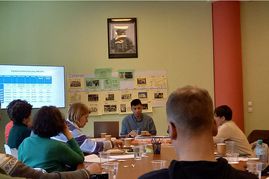
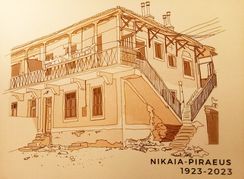
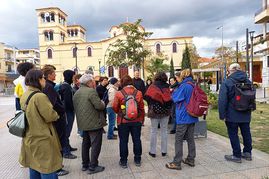
We concluded our exploration of the interwar period with a comparative panel discussion on fascist regimes in Europe through the examples of the Greek Metaxas regime (1936-41) and the Austrian Dollfuß/Schuschnigg regime (1933-38). Presentations by George Souvlis, Rosa Vasilaki, and Elisabeth Luif were followed by a collective discussion, especially on the relationship between modernity and fascism and on similarities between both regimes, for example their attempts to incorporate large segments of the population into state organisations.
Day 4 of our trip was dedicated to the second half of the 20th century, particularly the period of "repressive parliamentarism" (in the 1950s and 1960s), the military dictatorship (1967-1974), and the following transition to democracy (metapolítefsi). In the morning we met with historian Polymeris Voglis who introduced us to the conditions of the emergence of the military dictatorship as well as to various, even though marginalised, forms of resistance that existed.
Kostis Karpozilos, director of ASKI (Contemporary Social History Archives, also a transform! observer organisation), then introduced us to "Archives in Motion" and expanded on the example of ASKI to explain how the history of that specific archive reflected the history of the Greek Left. This led to a group discussion about conflicting interpretations of that history since the end of the military dictatorship.
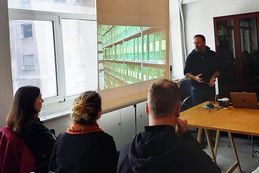
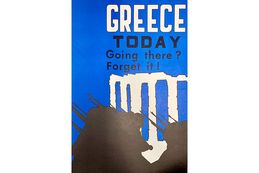
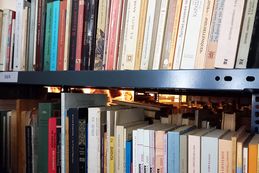
On the fifth and last day of our trip, we focused on representations of the past both in history and the present. We visited the exhibition "Nelly’s" at the Benaki Museum. Nelly’s was a popular and internationally renowned photographer in interwar Greece whose photographs were used by the Metaxas regime for propaganda purposes.
We met later on with historian Nathalie Patricia Soursos for a city walk. We were provided with additional background information on the propaganda by the Metaxas regime and could engage in critical reflection on the exhibition we visited. After a collective wrap-up session, we concluded our trip with a dinner.
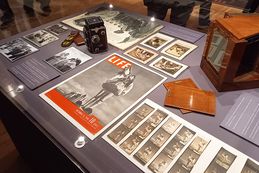
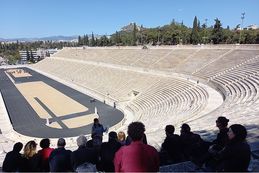
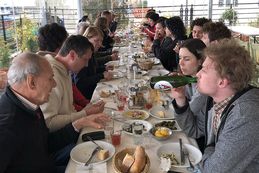
We express our heartfelt gratitude to all the speakers for their insightful contributions, and we extend our appreciation to the participants for the good discussions and the respectful and appreciative atmosphere in the group!
Trip organisation & supervision: Milena Jana Gegios, Elisabeth Luif, Barbara Steiner (present:history, transform! europe)


We would like to thank the following organisations for their kind support: Stiftung Auschwitz-Komitee, ÖH Uni Wien, GEWI, IG Geschichte, IG PoWi, BaGru Publizistik, BaGru*thewi, BaGru*i.e., StV/IG Germanistik.


![]()



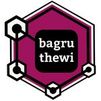

![]()